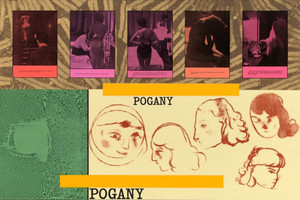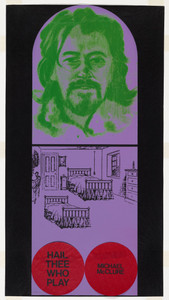
Ronald Brooks Kitaj(American, 1932–2007)
In 1989, Kitaj published his First Diasporist Manifesto. Its epigraph came from a line in The Counterlife, the novel of his friend Philip Roth “The poor bastard had Jew on his brain.” Kitaj opens the Manifesto with the line "I've got Jew on the brain."
Kitaj viewed himself as a perennial exile -- the quintessential diasporist Jew. Even his last name -- Kitaj (appropriated from his stepfather who adopted him), means "Chinese" in the Hebrew language -- a most apropos name for a diasporist, even if it was accorded him by happenstance and not birth.
R.B. Kitaj was born in Cleveland in 1932, but spent most of his life in England. He studied at the Royal College of Art and became part of the British Pop Art movement in the early 1960s, along with David Hockney Peter Blake Eduardo Paolozzi and others. Though fiercely independent, his early work was also influenced by Abstract Expressionism and Surrealism. In 1963 Kitaj had his first one-man exhibition at the Marlborough London Gallery. In 1964 he was represented at the Venice Biennale and the Documenta "3" exhibition and in 1968 at the Documenta "4", Kassel. In 1965-66 he visited the USA and was given his first retrospective at the LA County Museum of Art. He had a large retrospective exhibition of his work from 1958 to 1981 at Washington, Cleveland and Dusseldorf. In 1997, Kitaj returned to the United States, settling in Hollywood. He remained lifelong friends with David Hockney, and in later years would make frequent trips to Hockney's studio in Paris.
Kitaj died in Los Angeles in 1994.









